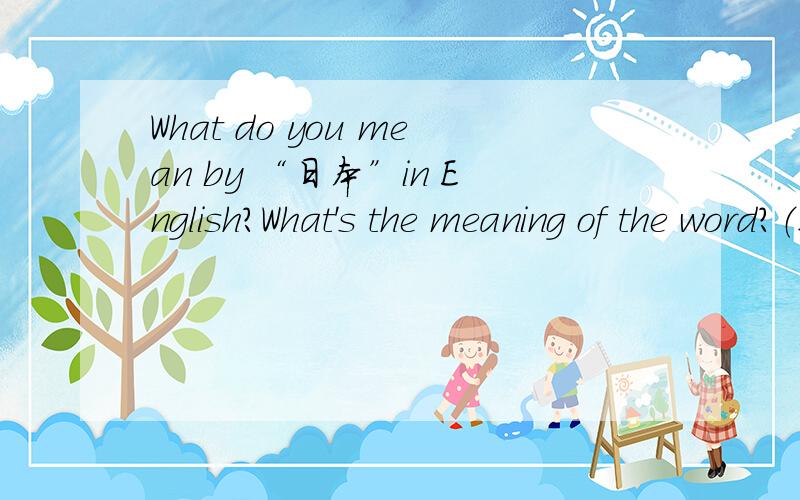What do you mean by “日本”in English?What's the meaning of the word?(这里的mean为什么这样用)There will be a friend coming here to see me tomorrow?(为什么是comeing,will后面不是原型吗)There were a large number of people
来源:学生作业帮助网 编辑:作业帮 时间:2024/07/20 23:15:38

What do you mean by “日本”in English?What's the meaning of the word?(这里的mean为什么这样用)There will be a friend coming here to see me tomorrow?(为什么是comeing,will后面不是原型吗)There were a large number of people
What do you mean by “日本”in English?What's the meaning of the word?(这里的mean为什么这样用)
There will be a friend coming here to see me tomorrow?(为什么是comeing,will后面不是原型吗)
There were a large number of people collecting garbage.(为什么用ing)
I didn't hear the phone.I must be out.(为什么不用must have gone)
The hat which he is wearing is black.(可不可以用that,为什么)
He is the boy that bought a bike here.(为什么不用whom)
The man whom/who/that you saw just now is my English teacher.(为什么可以用whom/who/that 晕死)
I‘d like to talk with the man sitting next to me.(为什么ing?)
What do you mean by “日本”in English?What's the meaning of the word?(这里的mean为什么这样用)There will be a friend coming here to see me tomorrow?(为什么是comeing,will后面不是原型吗)There were a large number of people
1、What do you mean by “日本”in English?What's the meaning of the word?(这里的mean为什么这样用)
mean作为动词在这个句子里面,句子结构类似于what do you do ……
这样看起来简单多了吧!
2、There will be a friend coming here to see me tomorrow?(为什么是comeing,will后面不是原型吗)
will后面是应该加上动词原形,句子中的“be”就是系动词啊,一个句子只能有一套主谓宾,所以在句子中出现的第二个动词就不能以原形方式出现,主动地状态就要用ing形式,被动的状态就要用ed的动词形式.
3、There were a large number of people collecting garbage.(为什么用ing)
道理同上啊.这个句子中已经有了一个动词“were”,collecting是由people主动做出来的动作,所以用ing形式喽.
4、I didn't hear the phone.I must be out.(为什么不用must have gone)
前面一句是过去式的:did not hear the phone
第二个句子就不能使用现在完成时have done sth,现在完成时的动作是指这个动作对现在这个时刻还存在影响.但是上句是过去式,下句的动词就不可能修饰到现在这个状态.
另外,be out在这个句子里是说过去的一种状态,而go这个词偏重说动作.did not hear the phone的时候人在外面(be out)远比走了(go)好一些.
5、The hat which he is wearing is black.(可不可以用that,为什么)
可以啊.which 和that 都可以引导从句哦.只有介词提前的状况只能用which,剩下的情况which 和that 通用.
例子:he just bought a hat on which there was a beatiful logo.这个句子中which前面有on这个介词,which就不能和that通用.只能是which.
6、He is the boy that bought a bike here.(为什么不用whom)
这个句子不是很书面话,最书面的形式:he is the boy who bought a bike here.
因为boy是个人,所以最好用who引导从句.who引导的从句boy作主语,就一定要用who
如果boy做宾语,则可以用whom引导从句.比如:he is the boy to whom the president give a notebook.这里的从句说的是the president give a notebook to the boy.boy这从句中作为宾语,所以用whom.不过其实现在国际上who和whom已经有通用的趋势了.但书面形式还是要分清楚.
7、The man whom/who/that you saw just now is my English teacher.(为什么可以用whom/who/that 啊,晕死)
最正规的必须用whom,不过如上面说的,who和whom有些通用了.所以who也可以在口语程度上接受.that最好不要用,太不正规了.
从句的内容是 you saw the man just now.the man在从句中作为宾语哦,所以whom最好.
8、I‘d like to talk with the man sitting next to me.(为什么ing?)
talk作为句子的谓语动词,那第二个动词是man发出的主动(非被动,被动状态要用ed哦)动作,所以用动词ing形式,上面和你讲过咯!
写的这么辛苦,记得给我分哈!